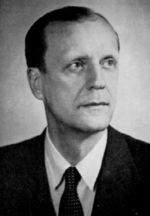罗格纳·纳克斯
出自 MBA智库百科(https://wiki.mbalib.com/)
罗格纳·纳克斯(Ragnar Nurkse)目录 |
罗格纳·纳克斯(Ragnar Nurkse,1907-1959年)出生于爱沙尼亚。在20世纪30年代早期他全家移居加拿大,他曾在爱丁堡大学和维也纳大学学习。作为国际联盟的一名职员,他发表了几篇关于国际经济学方面的非常著名的研究论文。第二次世界大战之后,他接受了哥伦比亚大学的教授职位并且一直呆在那儿,直到他在度假时在日内瓦过早地去世。
纳克斯重新强调了外部经济的重要性:所进行的投资越多,每项投资也就变得更加可行。因此,低收入经济要求一个宽广层面上的进步,与此同时伴随着相互支持并能增加成功机会的产业扩张。巨大的困难在于这些国家的贫困限制了他们的资本形成。他还提出了“贫困恶性循环论”。
纳克斯贫困恶性循环理论是由美国经济学家R.纳克斯(R.Nurkse,1953)提出的,纳克斯认为,发展中国家在宏观经济中存在着供给和需求两个恶性循环。从供给方面看,低收入意味着低储蓄能力,低储蓄能力引起资本形成不足,资本形成不足使生产率难以提高,低生产率又造成低收入,这样周而复始完成一个循环。从需求方面看,低收入意味着低购买力,低购买力引起投资引诱不足,投资引诱不足使生产率难以提高,低生产率又造成低收入,这样周而复始又完成一个循环。两个循环互相影响,使经济状况无法好转,经济增长难以实现。
Ragnar Nurkse was born in Käru village, now Raplamaa county of the then Governorate of Estonia of the Russian Empire, son of an Estonian father who worked himself up from lumberjack to estate manager and an Estonian-Swedish mother. His parents emigrated from Estonia to Canada in 1928.
Nurkse attended, after Russian-speaking primary school, the elite Domschule zu Reval, the most prestigious, German-language secondary school in Tallinn, from where he graduated with highers honors in 1928. He continued his education at the Law School and the economics department of the University of Tartu from 1926 to 1928, and then in economics at the University of Edinburgh. He graduated from Edinburgh with a first class degree in economics, under professor Sir Frederick Ogilvie, in 1932. He earned a Carnegie Fellowship to study at the University of Vienna from 1932 to 1934.
Nurkse served in the Financial Section and Economic Intelligence Service of the League of Nations from 1934 to 1945. He was the financial analyst and was largely responsible for the annual Monetary Review. He was also involved with the publication of The Review of World Trade, World Economic Surveys, and the report of the Delegation on Economic Depressions entitled "The Transition from War to Peace Economy".
In 1945, Nurkse accepted an appointment at Columbia University in New York City. He was a visiting lecturer at Columbia from 1945 to 1946, was a member of the Institute for Advanced Study in Princeton, New Jersey, from 1946 to 1947, and then returned to Columbia as an Associate Professor of Economics in 1947. In 1949, he was promoted to Full Professor of Economics, a position which he held almost until his death in 1959. Nurkse spent a sabbatical (1954-1955) at the Nuffield College of the University of Oxford, and in 1958-1959, another one studying economic development in the University of Geneva, and lecturing around the world.
In 1958, Ragnar Nurkse accepted a Professorship of Economics and the Director of International Finance Section position at Princeton University. However, before he could fully resume it, when Nurkse returned to Geneva in the spring of 1959, he died suddenly at the age of 52.
For his 100th anniversary on 5 October 2007, the Estonian Postal Service commemorated Nurkse with an international letter stamp. A large stone monument with a plaque will also be unveiled across the house he was born in Käru. He was also honored earlier in 2007 by the inauguration of a Lecture Series by the Bank of Estonia and an international conference by Tallinn University of Technology's Technology Governance program. An economics professorship at Columbia is named in his honor.
Nurkse is one of the founding fathers of Classical Development Economics. Together with Rosenstein-Rodan and Mandelbaum, he promoted a 'theory of the big push', emphasized the role of savings and capital formation in economic development, and argued that poor nations remained poor because of a vicious circle of poverty. Among his major works are International Currency Experience: Lessons of the Interwar Period (1944), the foundation of the Bretton Woods Agreement, Conditions of International Monetary Equilibrium (1945), and Problems of Capital Formation in Underdeveloped Countries (1953).
Ragnar Nurkse married Harriet Berger of Englewood, New Jersey, in 1946, and they had two sons. One of them is the poet Dennis Nurkse.








